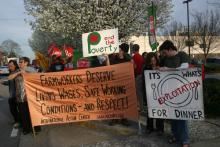Economic Justice



The United States hosts more than 23,000 payday lending stores, which outnumbers the combined total of McDonald’s, Burger King, Sears, J.C. Penney, and Target stores. These payday lenders do not make conventional loans as seen in most banks, but instead offer short-term loan amounts for short periods of time, usually until the borrower’s next paycheck, hence the name “payday loans.”
While some borrowers benefit from this otherwise unavailable source of short-term and small-amount credit, the payday lending business model fosters harmful serial borrowing and the allowable interest rates drain assets from financially pressured people. For example, in Minnesota the average payday loan size is approximately $380, and the total cost of borrowing this amount for two weeks computes to an appalling 273 percent annual percentage rate (APR). The Minnesota Commerce Department reveals that the typical payday loan borrower takes an average of 10 loans per year, and is in debt for 20 weeks or more at triple-digit APRs. As a result, for a $380 loan, that translates to $397.90 in charges, plus the amount of the principal, which is nearly $800 in total charges.




THE TRANS-PACIFIC Partnership may be the largest free trade agreement you’ve never heard of. Or if you have heard of the TPP, it’s likely due to media reports about efforts by President Obama to fast-track the agreement through legislative hurdles. Still, details of the agreement and its secret negotiation process are sparse. Were it not for released drafts of the document and sub-chapters made available by the whistle-blowing site WikiLeaks, it is likely the general public would know little to nothing of the accord.
Building on the foundation of a 2006 economic partnership agreement adopted to encourage trade between Brunei, Chile, New Zealand, and Singapore, the TPP’s expansion of the agreement grows the number of participant nations to 12, adding Australia, Canada, Japan, Malaysia, Mexico, Peru, Vietnam, and the United States. The combined economic force of these nations would dominate global trade, representing roughly $28 trillion—nearly 40 percent—of the world’s gross domestic product.
But the magnitude of this trading pool isn’t what concerns most critics of the TPP. What is more troubling to labor, environmental, and health groups are the powers seemingly granted to multinational corporations by the agreement and the unilateral easing of climate change laws that serve to restrain industrial nations from disproportionate consumption and pollution.
Expanded corporate powers are nothing new for international trade agreements. The North American Free Trade Agreement (NAFTA) gave rise to a legal quagmire that has allowed Exxon Mobil to challenge Canadian offshore drilling regulations, Dow Chemical to bypass local guidelines to expand pesticide production and waste disposal in Mexico, and Eli Lilly to enforce U.S.-issued drug patents and prices outside the country. Previously, under World Trade Organization treaty guidelines, a corporate entity needed to persuade its host country to challenge the trade laws of another. Corporations could not directly litigate against a sovereign nation or its policies.
On Feb. 8, tens of thousands of people gathered in the North Carolina capital city, Raleigh, for what organizers called the Moral March. It was a follow-up to last year’s “Moral Monday” movement that started in April 2013 when Rev. William Barber II, president of the North Carolina NAACP, and 16 others were arrested inside the North Carolina legislature for protesting sweeping voting restrictions proposed by the Republican-controlled state government.
I ALMOST DIDN’T go to the Moral March. I kept looking for excuses. There was all that work to be done for next week. I told my professor I’d miss Friday’s preaching class. I hoped she’d chide me and I’d feel guilty enough to stay. Instead she said, “Great, go with my blessing.” I told my tutor I’d miss tutorial. She said, “I’m so glad you’re going to the march.”
Why couldn’t I go to a normal graduate school where no one left their rooms? But instead I went to seminary, and to Union, of all places!
I said, God, I’m crazy to go. Mild laughter was the only response. I glared at my reflection in the dark window. The reflection raised her eyebrow and said, don’t be left behind now.
The little voice in the window stayed with me as I put an extra pair of thick socks in my bag. Don’t be left behind, reading books about other people’s marches and other people’s spiritual revelations and other people’s religions. This march is historic, my reflection informed me. Go and be part of history. This is your history.
This is your time.

Last summer we marked the 75th anniversary of President Franklin D. Roosevelt’s signing of the Fair Labor Standards Act – a landmark law that protected children, limited the number of hours in a workweek, and established the nation’s first minimum wage. The genesis of that law is often traced back to the story of one little girl who managed to get a poignant letter in the hands of the campaigning president. The note read:
“I wish you could do something to help us girls. We have been working in a sewing factory, and up to a few months ago we were getting our minimum pay of $11 a week. Today the 200 of us girls have been cut down to $4 and $5 and $6 a week.”
During this season of Lent, as we ponder the deep meaning of our faith, we also contemplate what that faith teaches us about the inherent dignity of every human being, how it compels us to better listen to one another, and why we must always strive to better serve one another.



Last weekend, I had the opportunity to spend the night at the Metropolitan House Men’s Shelter, part of Washington, D.C.’s, Metropolitan Memorial United Methodist Church.
And in this experience, Henri Nouwen’s, In the Name of Jesus came to life for me. In reflecting on his own experience of transitioning from Harvard University to L’Arche, a house for mentally disabled individuals, Nouwen realized he had to rediscover his true identity. Up until that moment, Nouwen relied on his accomplishments, achievements, accolades, educational training, and social connections to legitimize his impact and reputation in ministry as a priest. However, at L’Arche none of the things he relied on seemed to matter, and he had to gain credibility with those he planned to serve — the mentally disabled. Nouwen states, “I was suddenly faced with my naked self, open for affirmations and rejections, hugs and punches, smiles and tears, all dependent simply on how I was perceived at the moment” (28). Nouwen was forced to let go of his “relevant” self. Nouwen defines relevant self as, “the self that can do things, show things, prove things, build things.” Nouwen would have to allow himself to become vulnerable while suppressing his “relevant” self.

I don’t typically watch much television. But when I can, I watch The Daily Show. Jon Stewart brings humor, satire and truth telling to the news of the day — qualities also characteristic of the Hebrew prophets. When I once suggested that to Stewart, he immediately denied any similarity, saying, “No, no, no, I’m just a comedian from the Borsch Belt!” But further discussion revealed a selection of topics that evoke his moral passion and even a righteous anger at political hypocrisy.
That was on vivid display in a spotlight on what Fox News commentators were saying about food stamp recipients. It began with Fox saying how families who receive support from SNAP (the Supplemental Nutrition Assistance Program) should use their food stamps, and even what they should and should not be eating, which led to repeated condemnations of poor people.
The clips from those Daily Show commentaries are below and I suggest you take a few moments to watch them. They reveal what I am calling Fox News’ “preferential option for the rich,” which is in stark contrast to the gospel’s “preferential option for the poor” and what Pope Francis is now calling the church back to. Fox News’ repeated preference for the rich and condemnations of the poor is not just a political or economic issue, but a moral and religious failure. The faith community, in particular, should take note.

Dear Publix Leadership,
I should begin by saying that I am in almost all ways a big fan of your company. I often shop in a nearby Publix, and shopping there truly is a pleasure. It is clean. The staff are friendly and helpful. The products are good and the prices reasonable.
I'm especially impressed with the way Publix hires people with disabilities.
To provide a needed service and then go above and beyond in seeking to benefit the community — that's a winning combination, and a legacy to be proud of.
That's why I've been so surprised to see Publix (along with Wendy's) refusing (so far) to join the Fair Food Program. And that's why I've been outspoken in my desire to see Publix live up to the ideals of its founder, George Jenkins, who said, “Don’t let making a profit stand in the way of doing the right thing."





